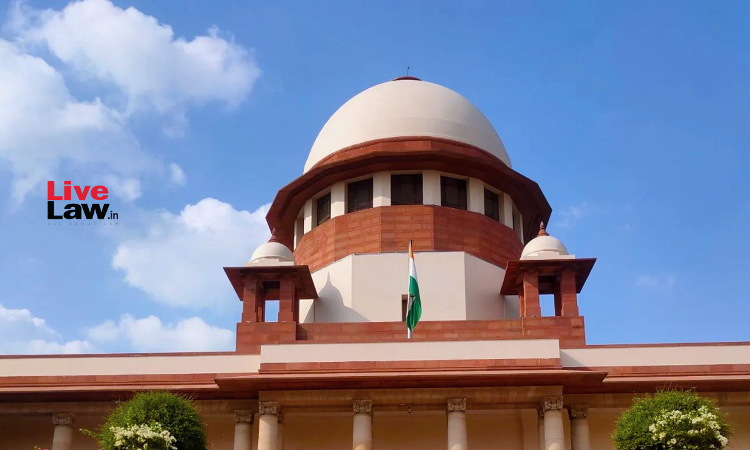- Home
- /
- Supreme court
- /
- Non-Recovery Of Crime Weapon Not...
Non-Recovery Of Crime Weapon Not Fatal To Prosecution Case If There Are Direct Reliable Witnesses : Supreme Court
Gyanvi Khanna
11 Jan 2025 5:00 PM IST
The Supreme Court, in its judgment dated January 10, reiterated that the non-recovery of the weapon of crime is not fatal to the prosecution case, if there are direct reliable witnesses.Reliance was placed on Rakesh v. State of U.P., wherein the Court had previously held that for convicting an accused, recovery of the weapon used in the commission of an offence is not a sine qua non.The...
The Supreme Court, in its judgment dated January 10, reiterated that the non-recovery of the weapon of crime is not fatal to the prosecution case, if there are direct reliable witnesses.
Reliance was placed on Rakesh v. State of U.P., wherein the Court had previously held that for convicting an accused, recovery of the weapon used in the commission of an offence is not a sine qua non.
The Bench, comprising Justices B.R Gavai and K.V. Viswanathan and Nongmeikapam Kotiswar Singh, was deciding the present appellants' plea against conviction under Section 302 (murder) of the Indian Penal Code. To summarise, it was alleged by the prosecution that the complainant saw accused persons assaulting the victim. This led to the victim's death. Before the Trial Court, the accused persons claimed innocence by pleading false implication. However, the Trial as well as the High Court had pronounced their ruling against the appellants. Thus, the present appeal.
At the outset, the Court perused the evidence and testimonies provided by the prosecution witnesses. It noted that the weapons (of murder) were recovered at the instance of the appellants. Both the seizures were witnessed by two witnesses. However, both the witnesses turned hostile. Though they admitted to putting their signatures on the seizure memos, they claimed it was because of a police threat. They also stated that the seizure was not preceded by any enquiry by the police
“What is important to note is that these two witnesses, however, did admit putting their signatures on the seizure memos. What they pleaded is that they did so at the instance/threat of the police and they did not know what was written on these documents.”
At this, the Court pointed out several discrepancies and noted that though the witnesses hailed from the same village, they claimed ignorance about the present incident. Notwithstanding, the Court said:
“Though both the witnesses have denied having any knowledge of the actual recovery of the weapons at the instance of the appellants, their denials do not appear convincing. However, since the IO of the case, PW-15 had proved the said seizure memos, we find no reason to hold that there was no seizure that was affected merely because the two seizure witnesses had turned hostile.”
It also said that the same would not affect the prosecution case because of the medical evidence showing that death was caused because of injuries from a sharp weapon. Moreover, it was seen by a direct eyewitness.
“Even assuming that the seizure of the weapons was effected without meticulously following the procedures and thus doubtful, in the view of the medical evidence which clearly showed that the deceased died because of the injuries caused by sharp weapon which was seen by a direct eye witness, namely, Lata Bai (PW-10), in our opinion, it would not prejudice the prosecution case.”
Apart from this, the Court had also found the evidence of the victim's mother, also the eyewitness, trustworthy and credible. It also referred to a plethora of judgments relating to discrepancies in the account of eyewitnesses. Based on this, the Court noted that even if there are certain contradictions, there is no cogent reason to disbelieve her claim.
“In conclusion, we are of the view that, the evidence of the sole eye witness, a hapless rustic illiterate woman visited with the vicissitude and tragedy of her son being fatally assaulted by covillagers before her own eyes, has withstood intensive cross examination and judicial scrutiny. She has answered the questions put to her during her cross examination with spontaneity without any jitteriness and her response was natural and not elusive and prevaricating, which all are signs of truthfulness of the witness.”
It thus concluded that the prosecution has established beyond reasonable doubt that the appellants were responsible for the death of the deceased. However, given that certain facts including if the act was premeditated or if there was any prior enmity were not established, the appellants' sentence was Section 304 (culpable homicide not amounting to murder) of IPC. Thus, the appeal was partly allowed.
Case Name: GOVERDHAN & ANR. V. STATE OF CHHATTISGARH., CRIMINAL APPEAL NO. 116 OF 2011
Citation : 2025 LiveLaw (SC) 50



